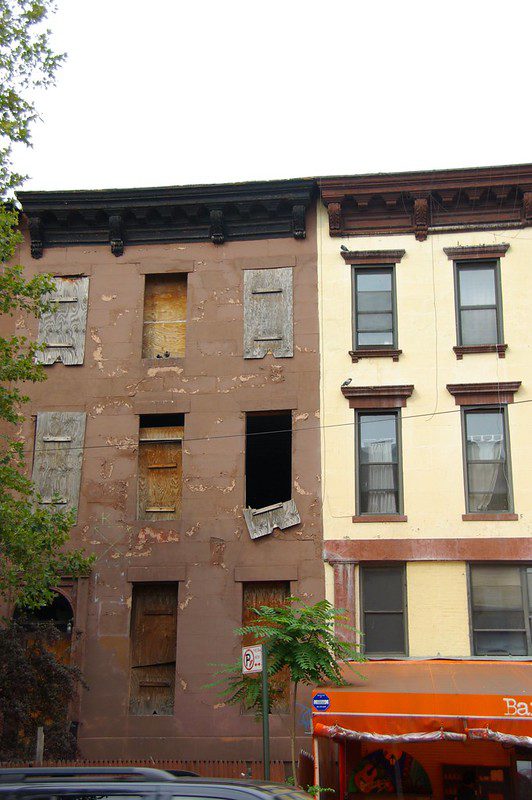ACORN Tenant Union Launched in Public Housing
One of the worst legacies of the Reagan-Bush years is the state of the nation’s public housing. While the need for low-rent housing increasingly outstripped the supply, drastic budget cuts curtailed both construction and modernization of public housing.
The residents of 1.2 million occupied units of public housing in the country are among the poorest Americans. Despite the reputation of public housing developments for gangs, drugs and crime, every city has a huge waiting list. But there are also a quarter of a million public housing units unrepaired and unoccupied.
Instead of building and modernizing, many cities now have plans to demolish public housing, often using HUD funds. In Kansas City, for example, the housing authority received $47 million to demolish a 418-unit development even though it has already demolished two towers at other sites without replacing a single unit.
While ACORN has organized in public housing developments for many years, a concerted effort began in December to build a national ACORN Tenant Union (ATU) in public housing. Although HUD regulations require public housing authorities to recognize and negotiate with resident councils, a majority of public housing residents are unorganized.
ATU’s initial organizing drives have focused on repairs, remodeling and occupancy of vacant units, as well as enforcement of new HUD regulations requiring preferential hiring of public housing residents to do the repair and rehab work.
In the first few months since ATU was founded, chapters have been formed in 40-plus developments in 20 cities, including Baltimore, Oakland, New York, Chicago, Kansas City, Bridgeport, New Bedford and Chester, PA. Some, like the Minneapolis High Rise Representative Council, which represents 6,702 units of public housing, are pre-existing tenant councils that have affiliated with ATU to gain organizing expertise, training, and the advantages of being part of a national organization, including access to top HUD officials. HUD Secretary Henry Cisneros is strongly supportive of ATU’s organizing efforts and continues to meet on a monthly basis with ACORN and ATU leaders.
At the end of April, ATU represented about 35,000 public housing residents. For more information, call Madeline Talbott at 312-939-7488.
Reprinted from The ACORN Report
CA Voters Defeat Tenant Tax Credit
A June 7 statewide referendum in California to enact a renters’ income tax credit fell victim to low voter turnout and a strong anti-government mood among voters.
Proposition 175 would have reinstated the tenant tax break and made it part of the state Constitution. Eliminated a year ago to help ease the state’s budget crunch, Senator David Roberti put the credit – which guaranteed a renters’ tax reduction of $60 per year for individuals and $120 a year for married couples – on the ballot. There was no organized opposition to the tax credit, although the Los Angeles Times, the state’s largest paper, published an editorial against it. The state’s tenant organizations lacked the capacity to mount any campaign on its behalf. It was defeated by an overwhelming fifty-seven percent to forty-three percent margin.
A Los Angeles Times poll conducted shortly before election day showed that voters with incomes below $20,000 favored the measure by a 48 percent to 35 percent margin, while those earning over $60,000 opposed it by a 61 to 31 percent margin. Only 38 percent of California’s registered voters went to the polls, the lowest in the state’s history. The turnout was particularly low among the poor, minorities and tenants, which accounts for some, though not all, of Proposition 175’s fate.
Voters stayed home even though the ballot included contested primary races for Governor and U.S. Senator as well as a host of local, state legislative and Congressional races and a number of ballot referenda. The voters who bothered to go to the polls rejected every proposal on the ballot that would increase the state debt, including separate bond issues to finance earthquake repairs, buy parkland and improve college campuses as well as the tenant tax break.
Rent Control Targeted in New York State
New York State’s rent control laws have come under increasing pressure from landlord groups. To allow rent control to continue in New York State, the Republican-controlled Senate pushed the state legislature to pass the Rent Regulation Reform Act of 1993, which created a means test for decontrolling apartments. Although the initial effects of this legislation will be felt only by the affluent (those in $2,000 or more per month apartments and who earn $250,000 or more per year), its implications have tenant activists worried. They see it as part of the continuing efforts of landlords to erode rent control.
Tenants Win One in New York City
Tenants in rent-stabilized apartments in New York City scored a victory. The New York City Rent Guidelines Board voted to allow a rent increase for renewal leases of only 2 percent per year – the lowest increase in the more than two decades of the Board’s existence. Many tenant activists are concerned that landlords, incensed at being allowed such a “low” increase, may try to reopen the hearings.





Comments